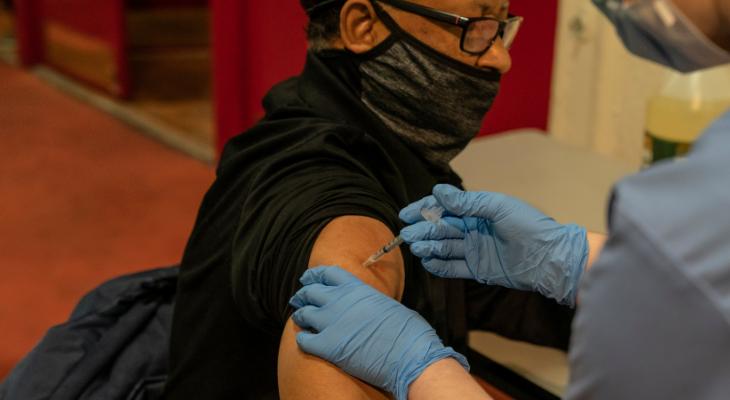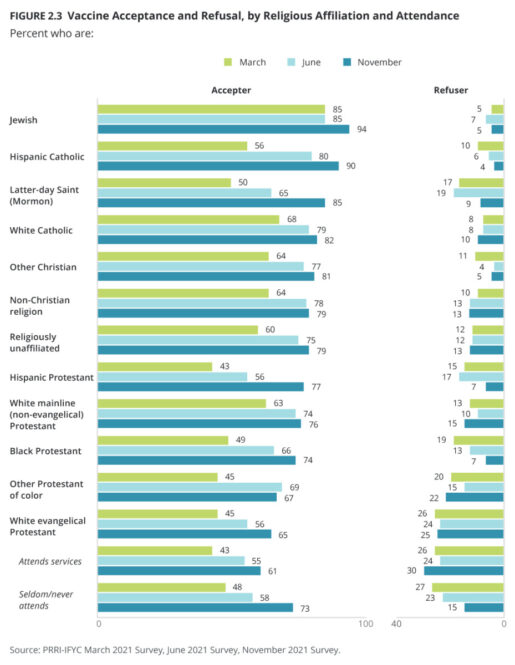PRRI/IFYC Survey Finds Faith-Based Interventions Have Helped Adults, Could Help with Children Getting Vaccinated
March 16, 2022

How do you restore and heal communities in the wake of the pandemic? Interfaith Youth Core has endeavored to do so through a nationwide interfaith initiative that advances equitable public health through religiously and culturally responsive vaccine outreach. Back in March 2021, IFYC launched the Faith in the Vaccine Ambassadors (FIVA), a program addressing vaccine hesitancy and access in various communities. As a part of the initiative, more than 1,500 people — including college students, campus staff, IFYC alumni, and community organizers from 109 campuses and myriad civic and faith-based institutions — were trained to conduct vaccine outreach.
To date, their efforts have been responsible for generating tens of thousands of personal touchpoints and many hundreds of events, primarily targeting rural areas, low-income communities, and populations with low vaccination rates. Studies like IFYC and PRRI’s Religion and the Vaccine show that initiatives like FIVA make a big difference.
This original article was posted on December 15, 2021.
More than half of Americans who attend religious services regularly say that a faith-based approach helped them decide to get vaccinated, according to a new survey by the Public Religion Research Institute (PRRI) and Interfaith Youth Core (IFYC), the largest study on religion and COVID-19 to date.
A vast majority of Americans (77%) are now vaccine acceptant, and the survey reveals that among religious groups there has been an overall increase in vaccination status. For example, nearly half of vaccinated Latter-Day Saints (46%) and a majority of those who attend religious services regularly (54%) say that faith-based approaches helped them make the decision to get vaccinated.
The findings are a part of Wave 3 of the Religion and the Vaccine Survey, expanding on findings from June 2021 and March 2021. Based on 5,721 responses from across the country, the study unveils new insights on COVID-19 vaccination mandates, religious exemptions, and trends in vaccine hesitancy and acceptance.
“This survey also shows that religious interventions have worked,” IFYC president and founder Eboo Patel said. “When pastors encourage vaccination and mosques hold vaccine clinics, more people get vaccinated. Faith-based groups remain ready to play our role, but we need partners. If we are going to defeat the Omicron variant, philanthropy, the private sector, and government will have to step up.”
Key survey findings on religious affiliation and vaccine acceptance:
1. Jewish Americans are most likely to be vaccine accepters (94%), up from 85% in June and March.
2. Among parents who say they are hesitant or will refuse to get their children vaccinated, 16% report that one or more of five tested faith-based approaches could convince them to get their children vaccinated.
3. Among parents who say they are hesitant or will refuse to get their children vaccinated, white Christian parents (12%) are less likely than Christian parents of color (30%) to say one or more religious approaches could positively influence their decision.
4. Even though white evangelical Protestants remain the religious group with the lowest percentage of vaccine accepters, they have steadily grown more acceptant, from 45% in March to 65% in November.
5. Nearly half of vaccinated Latter-Day Saints (46%) and a majority of those who attend religious services regularly (54%) say that faith-based approaches helped them make the decision to get vaccinated.
6. Fewer Black Protestants and Hispanic Catholics are vaccine refusers – especially compared to other religious groups. Overall, the proportions of religious groups that say they will not get vaccinated have held steady since March. But vaccine refusal is dropping significantly among Black Protestants (7% in November, from 19% in March) and Hispanic Catholics (4% in November, from 10% in March).
7. White evangelical Protestants who are more frequent church attenders (61%) are less likely than infrequent church attenders (73%) to be vaccine acceptant. Both groups have increased in acceptance since March (43% and 48%, respectively).
8. About eight in 10 white Catholics (82%, up from 68% in March), other Christians (81%, up from 64% in March), other non-Christians (79%, up from 64% in March), the religiously unaffiliated (79%, up from 60% in March), and white mainline Protestants (76%, up from 63% in March) are also vaccine accepters, as are about two-thirds of other Protestants of color (67%, up from 45% in March).
Share
Related Articles
American Civic Life
Faith Based Efforts Work in Vaccine Uptake: Now Let’s Make it Easy
American Civic Life
Higher Education
What Does Interfaith Engagement Mean from an Evangelical Perspective?

To learn more about IFYC and PRRI’s national research efforts, or to see how you can get involved in our vaccine outreach efforts, please click here.



